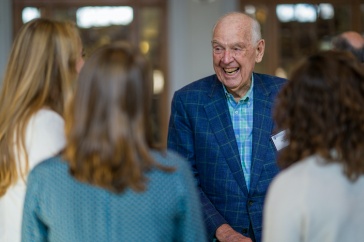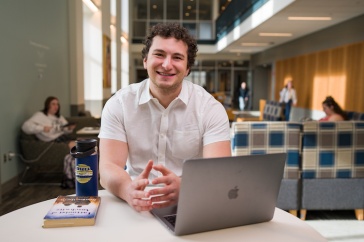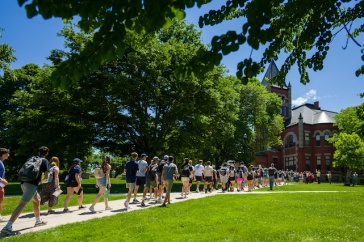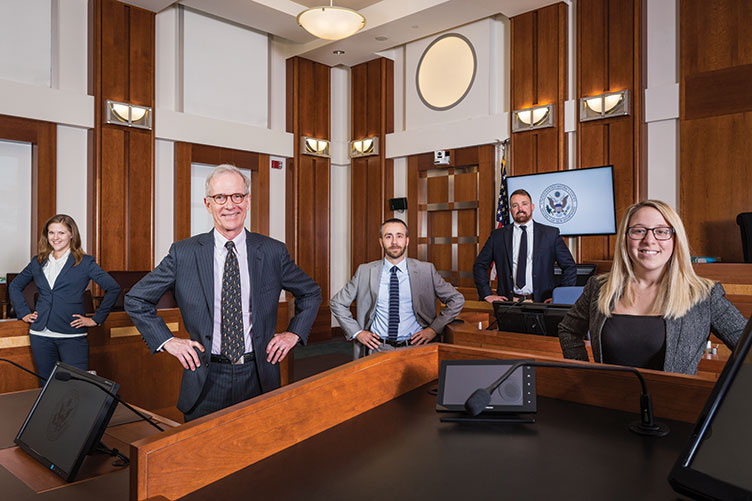
John Benford Photography
Rick Weeks ’12 JD stepped off the sidewalk outside the University of New Hampshire School of Law and folded his 6-foot-3 frame into the passenger seat of classmate John Fuentes’s MINI Cooper, bracing himself for a ride through the night to Alabama, where the pair was set to begin officer training for the Air Force.
Fuentes ’12 JD had already endured something of a road trip, trekking from New Jersey to New Hampshire to pick Weeks up before reversing course to head south. The brief Concord reunion had all the makings of a screenplay — former classmates and good friends reuniting outside of the law school they toiled at together, tossing their bags into the trunk and driving off into the unknown.
“It felt like my knees were around my ears,” Weeks says, recalling the cramped quarters inside the MINI. “He picked me up right in front of the law school and we drove through the night without stopping.”
UNH Law was more than just a backdrop in this tale, though. It was the only fitting point of departure.
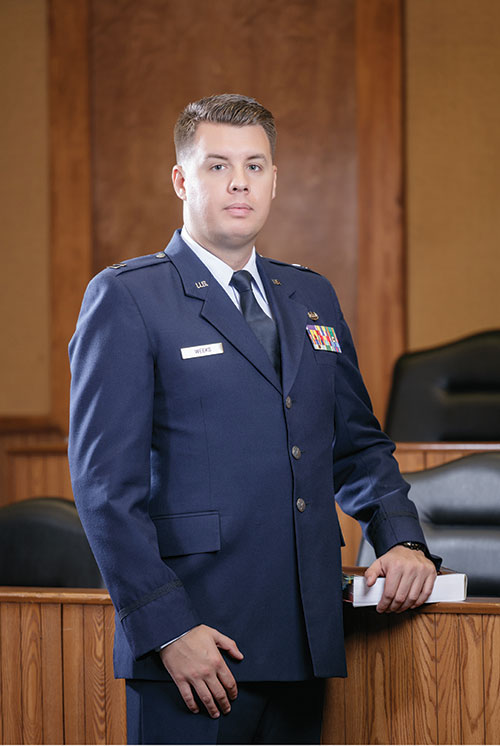
Weeks and Fuentes were ultimately headed for the Judge Advocate General (JAG) program in the Air Force. JAGs are responsible for handling all legal matters in the military and are generally thrown right into the fire. After a multi-week training on the specifics of military law, they typically walk directly into the courtroom.
For many of their fellow trainees, that experience was their first in front of a judge. Not so for Weeks and Fuentes. They were graduates of the Daniel Webster Scholar (DWS) Honors Program at UNH Law, a groundbreaking, first-in-the-nation program that puts students through a variety of real-world simulations during the final two years of law school and allows them to graduate without the need to take the traditional two-day bar exam. The DWS program may not have prepared Weeks and Fuentes for a marathon drive to Alabama — but it prepared them for what to expect when they got there.
“I definitely felt like I was more prepared than my peers,” Fuentes says. “There was just a level of confidence that I believe was related to the experience I had in the Daniel Webster Scholar program. It’s a general competence and confidence in the courtroom.”
“I was ahead of my peers. . . . John had us on our feet, in front of judges or other instructors, actively participating . . . that really helps prepare you for the courtroom.”
— Rick Weeks ’12JD
That same confidence can be found in JAG courtrooms all around the world. Zach Osterloh ’17 JD was accepted into the Marine Corps last spring, the latest feather in the cap of a program that has had students accepted into JAG programs in the Army, Navy, Marine Corps and Air Force, all within the first nine years of producing graduates.
Conrad Cascadden ’08 JD is one of those graduates putting the poise he learned in DWS into practice, serving as a lieutenant in the Navy based in Groton, Conn. He’s been performing advocacy work as a JAG, covering a territory that includes all of New England as well as parts of Pennsylvania and New York. He’s also a member of the first-ever graduating class of Daniel Webster Scholars.
Prior to entering the Navy, Cascadden spent more than six years as a litigator at the Shaheen & Gordon law firm in Concord, N.H., where the DWS program gave him a leg up almost immediately. Since he didn’t have to take the traditional bar exam, he was working at Shaheen & Gordon two weeks after completing law school, and was walking into a courtroom about a week after that.
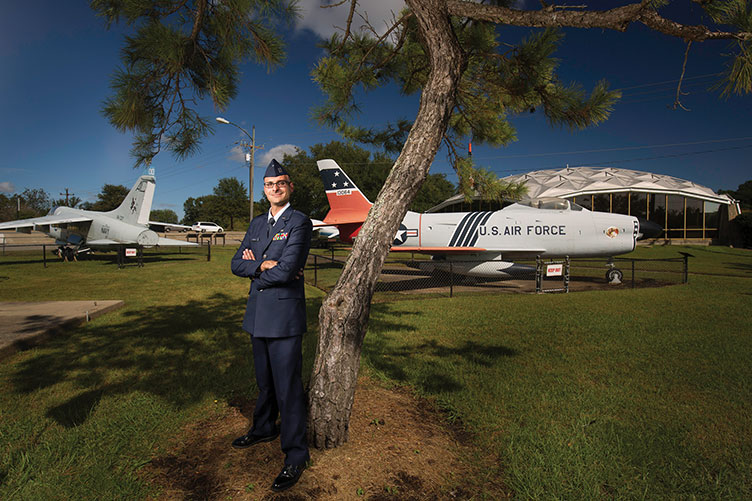
“I definitely felt like I was more prepared than my peers . . . . It’s a general competence and confidence in the courtroom.”
— John Fuentes ’12JD
“I was working, and my classmates were still studying for the bar exam,” he says. “I was there for maybe a week or two and they sent me off to court to work a case. In hindsight, because of the preparation from the program, it was a manageable task. But for someone who had never done those things before, it would have been difficult. I’m glad I had that background.”
The Daniel Webster Scholar program was conceived in part by UNH Law professor John Garvey, a Navy veteran who tried cases throughout the country — and in locales as exotic as Iceland — during his JAG career.
“The program is very experiential, and the military is very experiential,” Garvey says. “The program attracts people who like hands-on experiences, people who like challenges; it has a lot to do with professionalism and loyalty, and I think people attracted to the program often find the idea of being in the JAG corps appealing. The military does a lot of simulation, and that’s what the Daniel Webster Scholar program does — it gives people simulated experience and real experience. It’s all about being client-ready. When graduates enter the JAG corps, that’s exactly what they expect.”
By contrast, nobody knew quite what to expect when the DWS program was unveiled. It was a revolutionary approach to legal education; so revolutionary that it took more than 10 years to fully implement and launch due to the number of stakeholders that had to buy in.
It remains the only program of its kind in the country.
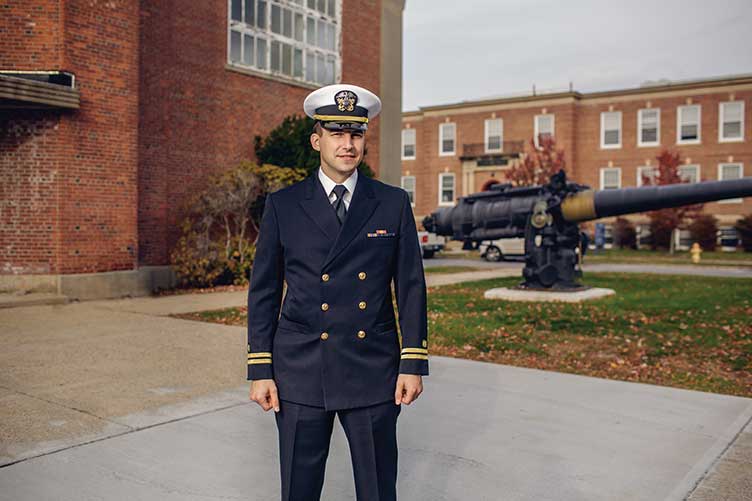
“I was working, and my classmates were still studying for the bar exam. I was there for maybe a week or two and they sent me off to court to work a case.”
— Conrad Cascadden ’08JD
Successful Daniel Webster Scholars pass a variant of the New Hampshire Bar exam during their last two years of law school, and are sworn into the New Hampshire Bar the day before graduation. Students are accepted into the program prior to their second year of law school and hone their skills in both simulated and real settings — counseling clients, working with practicing lawyers, taking depositions, appearing before judges, negotiating, mediating, drafting business documents — while creating portfolios of written and oral work for bar examiners to assess every semester.
Garvey recalls the protracted process of getting the program off the ground, most notably, the many meetings he had with lawyers and judges to ask if they’d be willing to hear oral arguments, read briefs and open their courtrooms for simulated experiences. The program launched with what he calls a “shoestring budget” — essentially his salary, part of an administrator’s salary and less than $10,000 for all other miscellaneous needs — and graduated its first class in 2008.
“Going into the program, we didn’t know what to expect out of it,” Cascadden says of the members of the first graduating class. “What we got was a truly good hands-on experience. Talking to people who went to other law schools or classmates who weren’t in the program, it was definitely a different educational experience.”
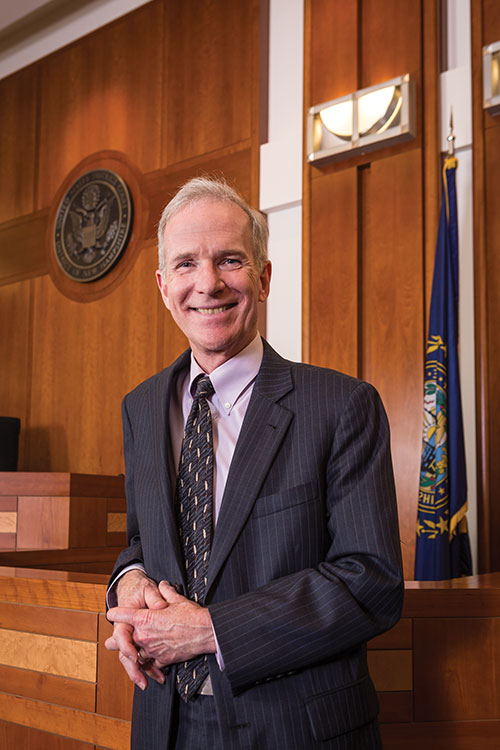
The program has since soared, earning extensive national acclaim. It was the subject of a two-year independent study by the Educating Tomorrow’s Lawyers Initiative of the Institute for the Advancement of the American Legal System (IAALS) at the University of Denver, which last year proclaimed that Daniel Webster Scholars are “ahead of the curve.” The study found that third-year Daniel Webster Scholars were outperforming their colleagues in the field who had been licensed to practice law for up to two years.
The DWS program also was featured in the Wall Street Journal and New York Times in 2015, and was also one of only three recipients that year of the E. Smythe Gambrell Professionalism Award from the American Bar Association (ABA), which recognizes “excellence and innovation in professionalism programs by law schools, bar associations, professionalism commissions and other law-related organizations.”
There have been individual honors as well. During his first year in the JAG corps, Rick Weeks was named the ABA’s Air Force recipient of the LAMP Distinguished Service Award, given each year to one recipient from each branch of the military for setting “the bar for military legal assistance, by pushing themselves and their practices in extraordinary ways.”
“I definitely credit my Daniel Webster Scholar preparation for receiving that award,” Weeks says. “I think I was ahead of my peers. I think of how many times John had us on our feet, in front of judges or other instructors, actively participating — I think that really helps prepare you for the courtroom. I don’t believe I had the nerves some of my other counterparts had during their first trial.”
“It’s all about being client-ready. When graduates enter the JAG corps, that’s exactly what they expect.”
— John Garvey, UNH Law
More than 200 students have successfully moved through the DWS program in the last nine years, entering all fields of law around the country and overseas. Many continue to gain acceptance into the various branches of service as well. Matt Flynn ’17 JD has been accepted into the Army and will enlist after he graduates in May.
Garvey remains a driving force behind that success, and the lessons he imparts have had a significant impact on many of the graduates of the program.
“I’ve thought about it a lot, and I don’t think I would be the professional I am today without John Garvey,” Cascadden says. “One of the biggest things I pulled out of the program is the professionalism training that is underwritten by how you work in DWS. You kind of become a bunch of junior associates, and that’s how he treated us. I changed so much because of his mentorship.”
The students have similarly left a lasting impression on Garvey, who is preparing to watch a tenth class of graduates complete the program next spring. That’s given him pause to reflect on how far the program has come in a relatively short time and how much of an impact its graduates are having on the world of law — particularly military law.
“For me, it’s been personally extremely rewarding,” Garvey says. “I think of all of these people as sort of like my kids. When they have their tough moments, they contact me and we work through things. I think people understand that they are joining a program that is bigger than they are, that they have a responsibility that is bigger than just their responsibility to do well in law school. I think that causes people to step up.”
Originally published in UNH Magazine Winter 2017 Issue
-
Written By:
Keith Testa | UNH Marketing | keith.testa@unh.edu

















































